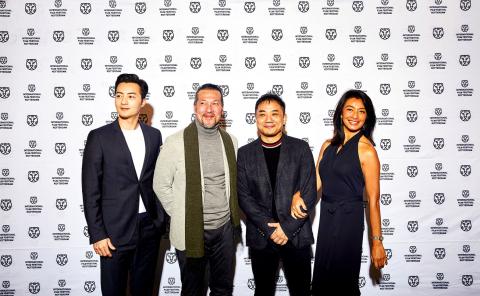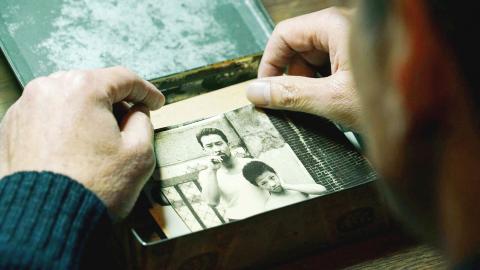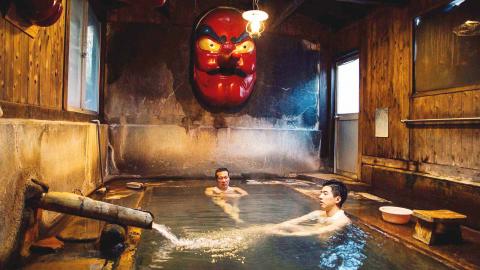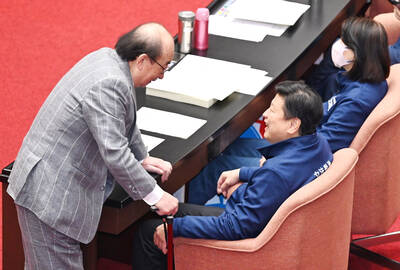Growing up, Taiwanese filmmaker Hsiao Ya-chuan (蕭雅全) shared a rocky relationship with his father. Solemn and overly frugal, his father was consumed with saving money, and faced difficulties communicating with his children, recalls the now 50-year-old.
“He was a very thrifty person because he grew up in very poor circumstances. But he didn’t know how to talk about his inner emotions, about his own sorrow and happiness, as though his entire life had been repressed by the lack of money,” Hsiao says.
These memories of his late father, who passed away five years ago, were what inspired the director to make his third feature Father to Son (范保德), which made its world premiere at the recently-concluded International Film Festival Rotterdam (IFFR). The fictional film was nominated for the VPRO Big Screen Award, alongside Taiwanese-Dutch coproduction An Impossibly Small Object by David Verbeek, though it did not win. It is set for a commercial release in Taiwan in September.

photo courtesy of Hsiao Ya-chuan
Father to Son follows protagonist Van Pao-te (Michael JQ Huang, 黃仲崑), who realizes on his 60th birthday that he is dying. With time running out, he heads to Japan with his own son in search of his father who abandoned him 50 years previously. At the same time, a young man with a mysterious connection to Van’s past travels from Hong Kong to Taiwan.
Much of Father to Son fleets between the past and the present over the course of its 115-minute running time — the film charts the complex relationships between intergenerational pairs of father and son, against the backdrop of Taiwan’s tumultuous history under colonial rule in the last century.
“Taiwan has a very complicated history — first it belonged to China, then it belonged to Japan and before that it was under Dutch rule. The search for the father in the film parallels a similar search for identity in the hearts of many Taiwanese,” Hsiao says.

photo courtesy of Hsiao Ya-chuan
As the father of a 13-year-old son and a 16-year-old daughter himself, the director says he is determined not to follow in his late father’s footsteps when it comes to his own children.
“My father’s frugality created a sense of insecurity in me, as if the family could run out of money anytime. There was a feeling of poverty, where we never had enough to do the same things other people could. When I had my own family, I really hoped my children would not have the same feeling.”
Yet Hsiao admits that try as he might, the apple never falls far from the tree, as the characters in his film demonstrate.

photo courtesy of Hsiao Ya-chuan
“We don’t know if it’s because of our genes or the environment we’ve grown up in since [we were] young, but it’s always difficult to break away from the influence of our families. My friends and I realize that strangely, as we grow older, we are becoming more like our fathers.”
Father to Son marks Hsiao’s return to the silver screen after an eight-year-absence since his second feature, Taipei Exchanges (第36個故事, 2010), which was released a decade after his debut Mirror Image (命帶追逐, 2000). The director says these prolonged filmmaking droughts were not due to creative blocks; instead he was busy shooting television commercials amid a perceived slowdown in the Taiwanese film industry.
“The atmosphere for movies was not as great before. The industry for television commercials is more matured, so many people who liked to shoot films went to do that. But the film industry has been getting better recently, so a lot of older people like me who turned to commercials are now returning to film.”
And like his two previous films, Father to Son is also the third of Hsiao’s films to have legendary Taiwanese filmmaker Hou Hsiao-hsien (侯孝賢) on board as executive producer. Hsiao served as Hou’s assistant director on the set of his 1998 film, Flowers of Shanghai (海上花).
“After I finished working on Flowers of Shanghai, I wanted to make my own film (Mirror Image) so I invited Hou to be my supervisor and he agreed. It was a very natural process, him advising me and us working together. And it became a habit,” he says.
With the duo having collaborated on a number of successful productions together, one might wonder if Hsiao often gets compared to the older Taiwanese maestro by outsiders, or perhaps even feel overshadowed by his mentor.
“Every author is afraid of being like another person. Hou Hsiao-hsien is a very renowned and powerful director and because he has always supported me, my biggest fear is to be like him. But of course, we have creative differences when it comes to the aesthetics of film,” says Hsiao, adding that they always work things out eventually.
“He is an elder who takes very good care of the younger generation, and I feel very honoured that he is looking after me,” Hsiao says. “I would never think that he is blocking my spotlight.”

On Jan. 17, Beijing announced that it would allow residents of Shanghai and Fujian Province to visit Taiwan. The two sides are still working out the details. President William Lai (賴清德) has been promoting cross-strait tourism, perhaps to soften the People’s Republic of China’s (PRC) attitudes, perhaps as a sop to international and local opinion leaders. Likely the latter, since many observers understand that the twin drivers of cross-strait tourism — the belief that Chinese tourists will bring money into Taiwan, and the belief that tourism will create better relations — are both false. CHINESE TOURISM PIPE DREAM Back in July

Taiwan doesn’t have a lot of railways, but its network has plenty of history. The government-owned entity that last year became the Taiwan Railway Corp (TRC) has been operating trains since 1891. During the 1895-1945 period of Japanese rule, the colonial government made huge investments in rail infrastructure. The northern port city of Keelung was connected to Kaohsiung in the south. New lines appeared in Pingtung, Yilan and the Hualien-Taitung region. Railway enthusiasts exploring Taiwan will find plenty to amuse themselves. Taipei will soon gain its second rail-themed museum. Elsewhere there’s a number of endearing branch lines and rolling-stock collections, some

Could Taiwan’s democracy be at risk? There is a lot of apocalyptic commentary right now suggesting that this is the case, but it is always a conspiracy by the other guys — our side is firmly on the side of protecting democracy and always has been, unlike them! The situation is nowhere near that bleak — yet. The concern is that the power struggle between the opposition Chinese Nationalist Party (KMT) and their now effectively pan-blue allies the Taiwan People’s Party (TPP) and the ruling Democratic Progressive Party (DPP) intensifies to the point where democratic functions start to break down. Both

This was not supposed to be an election year. The local media is billing it as the “2025 great recall era” (2025大罷免時代) or the “2025 great recall wave” (2025大罷免潮), with many now just shortening it to “great recall.” As of this writing the number of campaigns that have submitted the requisite one percent of eligible voters signatures in legislative districts is 51 — 35 targeting Chinese Nationalist Party (KMT) caucus lawmakers and 16 targeting Democratic Progressive Party (DPP) lawmakers. The pan-green side has more as they started earlier. Many recall campaigns are billing themselves as “Winter Bluebirds” after the “Bluebird Action”